'I was given months to live, but I'm still here'
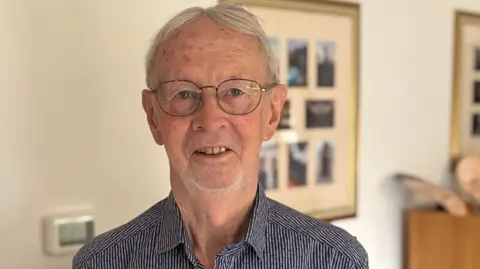 George King/BBC
George King/BBCIn early 2021, while sitting in a parked car and on the phone to an oncologist he had never met, Tim Strugnell was told he had "months not years" left to live.
Up until that point, since being diagnosed nine years earlier, treatments and hormone drugs had succeeded in keeping the 76-year-old's prostate cancer at bay.
The pensioner's defiant attitude, he believes, had also played a key part, and this time would be no different, with Mr Strugnell vowing "to fight this thing".
Four years later, having taking part in three medical trials, all with varying levels of success, the retired school teacher tells the BBC he feels "more positive than ever".
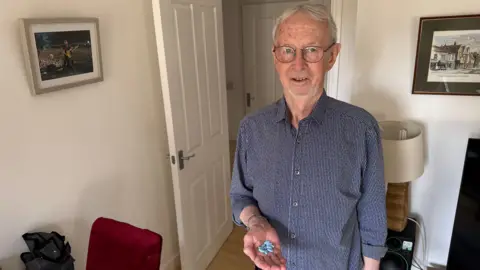 George King/BBC
George King/BBCAccording to the National Institute for Health and Care Research (NIHR), over 79,000 people took part in research funded or backed by the NIHR in the East of England last year.
And between 2023 and 2024, more than one million people in England took part in a total of 6,074 studies for an array of conditions, including cancer, heart disease and dementia.
But medical trials do not work for everyone, and while Mr Strugnell says he is now feeling the benefits of taking part, his experience has not been without its setbacks.
'Feeling very low'
The lifelong Ipswich Town fan, who taught in Suffolk and Norfolk and now lives in Essex, was thrown his first potential lifeline in the form a new cancer vaccine in 2022.
The opportunity came a year after he had been told his cancer had spread to the lymph nodes in his stomach and was no longer responding to treatment.
After experiencing little to no side effects, Mr Strugnell, then trialled immunotherapy infusion treatment.
The hope is that it would rally his white blood cells together to attack the tumours in his body - but it did not have the desired effect.
"It stopped working and I got a terrible pain in my stomach, so they sent me back to Colchester Hospital for more chemotherapy and radiotherapy, but that made me violently sick," he said.
"I lost my appetite and I was feeling very low."
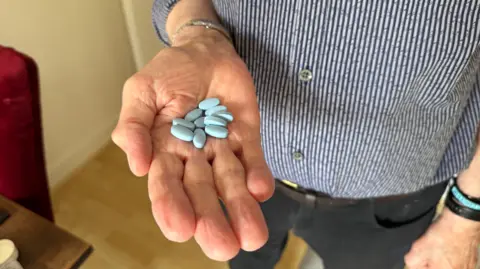 George King/BBC
George King/BBCBut all hope was not lost.
Within weeks of attending an event at the House of Commons to raise awareness about clinical trials, Mr Strugnell was given the chance to try another new drug.
Combined with hormone medication which cuts off his testosterone, the large blue tablets strive to shrink the size of a cancer – and they seem to be working.
When Mr Strugnell started the treatment his PSA score – a metric which measures how large a patient's prostate cancer is - was 177.
But for the last six months, it has been between 10 and 17.
"The lower it is the better, so I am really, really positive about this drug," he said.
"It's not stopping me from doing anything and I am doing far more than a lot of people my age.
"My whole life has changed - I have a lot more energy and enthusiasm and I am not thinking 'I don't know how long I've got'.
"I am more positive now than I ever been."
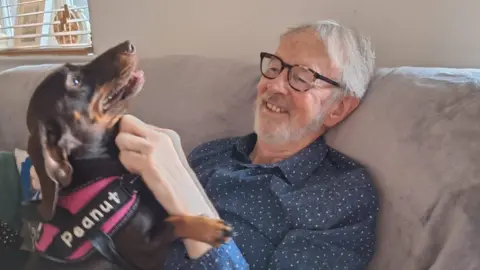 Supplied
SuppliedWhile clinical trials are seen by some as positive, in that they can help advance healthcare, there are also downsides prospective patients must consider.
According to Cancer Research UK, for example, some patients "may have unexpected or serious side effects" and there can be "some risk an experimental treatment could harm you".
But for Mr Strugnell, the risks were worth taking.
"I suppose I am a Guinea pig but you're thinking 'this might work for me, this might help me, and it cannot get any worse, so I will try it'," he said.
"I am not doing it for people in the future, I am doing it for me, but if it does help people then that's absolutely fantastic and amazing, because it is giving people hope."
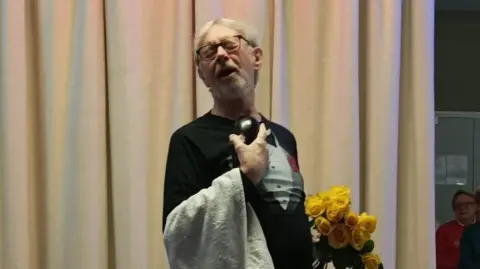 Supplied
Supplied'Go away, I am not going to let you win'
With a new found sense of optimism, Mr Strugnell, who still loves performing on stage and writing children's book, is keen to continue to live life to the fullest.
"I am not going to behave like some 76 year olds I know," he said,
"I have this kind of energy about me and my life, so the future holds lots for me.
"If you keep positive then you and your body can deal with it, but if you give up it will take over."
If you have been affected by the issues raised in this story you can visit the BBC Action Line for help and support.
Follow Suffolk news on BBC Sounds, Facebook, Instagram and X.
